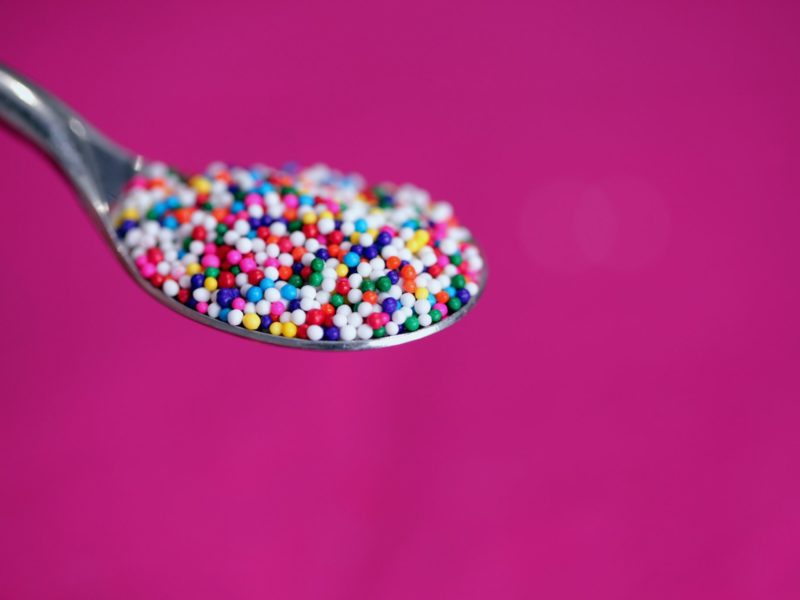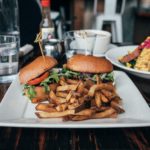Sometimes, Removing Something is Better
I often teach that adding to your life is a better way to create sustainable health changes (examples being, water, gratitude, meditation, sleep, exercise). There is one area though where removing something is actually better.
In Part 2 of the 4 Small Steps For Big Health Change, I am going to address why cutting back on, or removing, sugar from our diets has a massive impact on our wellbeing. It gets a little sciencey, but hang in there, I promise it’s worth understanding ????
Check out Part 1 of the 4 Small Steps For Big Health Change – Water
Mental Health & Sugar
Before addressing sugar’s impact on our mental and emotional health, let’s address some of the technical details.
The Gut & Brain Conversation
Much of our immune system is in the gut.
Science is revealing that instead of being independent and separate from each other, our body’s systems are intricately connected. One of the biggest breakthroughs here is that our gut health has a huge impact on our mental health.
In Dr. Uma Naidoo’s book, “This is Your Brain on Food,” she explains that there are approximately 39 trillion bacteria in our gut, and logically, what we eat impacts those bacteria.
What Foods Support The Gut-Brain Connection?
Foods high in fiber, probiotics, folate, and B vitamins support “good” bacterial growth.
On the other end, processed foods, sugar, unhealthy fats, heavy metals, pesticides, and even gluten, support “bad” bacterial growth.
But A Little Sugar Is Okay, Right?
The mind-blowing part? What you eat can have a huge impact on you in just 24 hours.
So eating the sugar and processed foods can quickly create an environment of dysbiosis (an unfavorable balance between good and bad microbes) which can cause inflammation.
Inflammation over long periods of time is how environments for illness and disease are created – including mental illnesses such as anxiety and depression (Watch Dr. Naidoo address these points here).
How Does Sugar Impact Mental Health?
Disruptions in the gut microbiome cause our gut and our brain to have a different conversation (the vagus nerve connects the two to create the gut-brain axis).
Because of changes in transmission, inflammation, and behavior during this conversation, psychological disorders, such as anxiety and depression can happen. This is in large part, because of a transporter in the gut that is vital to our cells being unable to bring in serotonin effectively.
Seratonin is responsible for our feelings of well-being and happiness. More than 90% of serotonin receptors are found in the gut!
Can You See The Sugar Connection?
The state of our gut health is heavily influenced by what we eat. If what we’re eating creates a disturbance in our gut, our mental well-being is impacted. Fix our food, along with proper pharmacological treatment when necessary, and we can heal.
What is a leading detriment to our gut health? SUGAR!
If you read my article on Salt, Sugar, & Fat – Food Addiction & Poor Health, you’ll remember that sugar is added to almost everything. It is actually difficult to go to the grocery store and find inside aisle foods that don’t have some form of added sugar. Food companies know that sugar is addictive and enhances the flavor of engineered foods. In fact, a specific combination of salt, sugar and fat is used so that an otherwise gross “engineering project” can be palatable, and for their continued profits, addictive. Worse still, marketing and disguising sugar under different names allows the food companies to trick you into thinking you’re making healthy choices. Friends, because of this, we are eating 100 times more sugar than we were just 150 years ago (Listen to Damon Gameau talk about this on the Wellness Force Podcast here).
Physical Health & Sugar
Bear with me for just a few more nerdy points as we move from mental to physical health!
Our bodies need a balance of sugar and fat to create energy efficiently. The problem comes with a constant overload of sugar, which is what is defining the obesity pandemic in our country. Here’s how this breaks down;
Ingesting carbohydrates and sugar causes an insulin response. Insulin tells our cells to bring sugar in from the blood.
What Happens When We Eat Too Much Sugar?
With an overload of sugar in the blood, we are requiring our bodies to continually secrete insulin.
Our cell’s receptors become resistant (or numb) to insulin’s constant demands. I’d be annoyed if too if someone kept knocking on my door and asking me to deal with outsiders with no rest!
The lack of a response from our cells only makes our body secrete more insulin to try to overcome the problem.
Because there is so much sugar in the blood, our bodies think it has enough energy from sugar and we don’t metabolize fat for fuel (we want to use fat for fuel!). The other edge of this sword? Because our cells aren’t bringing in glucose for energy efficiently due to desensitization to insulin, we feel run down and fatigued (Listen to Dr. William Li talk about this on the Wellness Force Podcast here).
The Take-Home Points
- Seven of the 10 leading diseases are related to poor sugar control (Listen to Dr. Casey Means talk about this on The Broken Brain Podcast here).
- Glucose spikes, or chronically elevated blood glucose, creates inflammation, oxidation, glycation (sugar-coating substances such as LDL cholesterol), energy crashes, and an inability to burn fat.
- WE NEED TO MINIMIZE, OR AT LEAST DRASTICALLY REDUCE, THE AMOUNT OF SUGAR IN OUR DIETS.
Secret’s Out!

But, We Got This!
But, be encouraged! Turn that frown upside down! There are small steps we can take to begin cutting back on the amounts of sugar sneaking into our diets.
- Shop the outside aisles at the grocery store.
- Stop drinking sugary drinks! This one step alone can make a fast and noticeable difference in how you feel.
- Learn the various names of sugar and check your food labels.
- Eat single-named, whole foods. Broccoli is broccoli. If it has a label, can you avoid it?
- Plan your meals and cook more. Know what’s in your food.
- Give your body a period of rest without eating. This will allow us to use fat for energy and help reduce cravings because of a myriad of health benefits that come along with the rest. Can you stop eating after dinner and push your breakfast a few hours in the morning?
As with anything, I’m not suggesting trying each of these things at once. I suggest picking one, practicing it for a month, and after it feels more second nature to you, add on the next step. Just being mindful of the way sugar can impact your emotional and physical health is a big step. It’s pretty incredible to see how fixing our food can have such a huge influence on our healing, and our body’s overall ability to function properly. So for this month, I challenge you to remain conscientious of your sugar intake, and work to reduce it!
I Can Help!
Hi! As a fitness and nutrition strategist, I work to help people take small steps toward lasting health change. These steps will be positively disruptive to your life and health! And the best part?! They won’t require you to completely shake up and change your day-to-day routine. Together, we will navigate your lifestyle, current health status, environment, and health/fitness goals to create steps to uniquely fit who you are. For an initial consultation, email me at amandaaddis86@gmail.com. I look forward to connecting with you!
~ Amanda
Amanda Haile

Interested in eating more healthy for life?
Listen to our friends over at Wellness Force Radio to learn about the “5 Must Have Nutrition Fundamentals”











 Best Brain Supplements for Mental Health and Focus
Best Brain Supplements for Mental Health and Focus